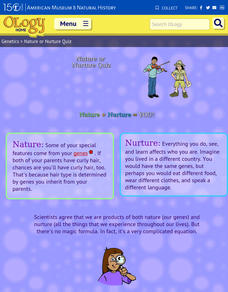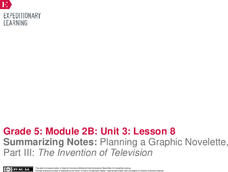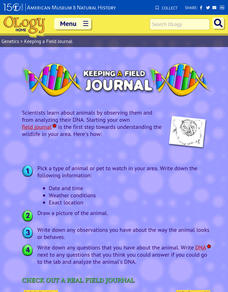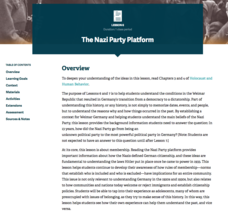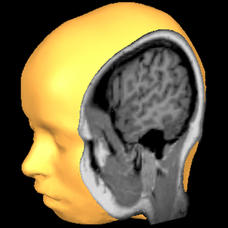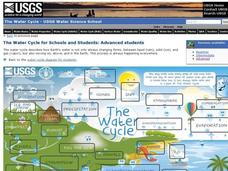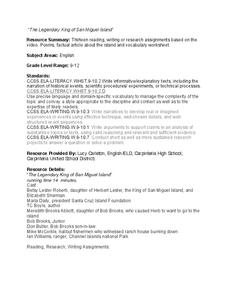American Museum of Natural History
Nature or Nurture Quiz
Eighteen questions ask pupils whether certain behavior or trait is based on nature or nurture. Scholars take a quiz, reflect on their answers, then challenge a friend or family member to complete it.
EngageNY
Summarizing Notes: Planning a Graphic Novelette, Part III: The Invention of Television
How did the television change people's lives? Learners consider the question as they complete their storyboards about the invention of the TV, adding visual elements along the way. Then, they participate in a peer review to offer and...
American Museum of Natural History
Keeping a Field Journal
Young scientists begin a field journal by following four steps. A real-world example of an entry showcases the different parts, including location, date, drawings, and more.
Institute of Electrical and Electronics Engineers
Adaptive Device Design
After reading about how engineering has made adaptive devices possible for people with disabilities, pupils work in groups to discuss different devices to determine whether or not they are adaptive. They also disassemble a pair of...
Facing History and Ourselves
The Nazi Party Platform
Not all party platforms stay democratic. A resource covers many political issues in Germany during the time of World War II, and teaches pupils about the Nazi party platform and what went wrong. Individuals participate in a warm-up...
K12 Reader
Location, Location, Location
Why do some places in the world have more people living there than other places? Learn about the ways the countries have formed around natural resources with a reading comprehension activity. After kids read a short...
Worksheet Web
Let it Snow
After reading an informational text detailing the ins and outs of snowflakes, scholars draw their own special design then work cooperatively to role play a snowman building scenario.
Rainer Goebel
Brain Tutor 3D
The human brain is staggeringly complex, and its structure can seem impossible to grasp. This user-friendly app allows for exploration of the brain's anatomy, providing nomenclature, 3-D mapping, and functions.
Achieve3000
Discriminating Phonemes 2
Some sounds sound very similar! Help your class learn how to distinguish between various sounds by following the steps outlined in this plan. The plan includes a warm-up, a teacher-led portion, and details for guided and independent...
Federal Reserve Bank
To Rent-to-Own or Not to Rent-to-Own?
Explore the key elements of a contract with your young adults, and delve into the features and unique benefits of a rent-to-own contract through discussion and worksheet practice.
Illustrative Mathematics
Tilt of Earth's Axis and the Four Seasons
Geometry meets earth science as high schoolers investigate the cause and features of the four seasons. The effects of Earth's axis tilt features prominently, along with both the rotation of the earth about the axis and its orbit...
Special needs in Music
Music Work Sheet (Special Ed)
Music is beneficial for all learners. Help your learners with special needs learn about different styles of music, as well as the ways that music is represented on paper, with 30 different worksheets.
Curated OER
Volcanoes: Third Grade Lessons Plans and Activities
Discover how rocks are formed from volcanoes during a geology pre-lab activity. Third graders describe the volcanic rock samples and creating a model of Mt. Lassen, located in California. The lesson culminates in...
Constitution Facts
U.S. Constitution Crossword Puzzles: Basic #1
Reinforce U.S. Constitution facts with a crossword puzzle. Scholars show what they know by completing the 53 prompts.
Constitution Facts
U.S. Constitution Crossword Puzzles: Basic #2
Fifty prompts make up a crossword puzzle that challenges scholars to show what they know about the U.S. Constitution.
Statistics Education Web
Double Stuffed?
True or false — Double Stuf Oreos always contain twice as much cream as regular Oreos. Scholars first measure the masses of the filling in regular Oreos and Double Stuf Oreos to generate a class set of data. They use hypothesis testing...
NOAA
Deep-Sea Ecosystems – A Tale of Deep Corals
Many have debated which came first, the chicken or the egg, but this lesson debates which came first, the hydrocarbons or the carbonate reef. After a discussion on deep-sea corals, scholars receive a set of questions to research and...
Curated OER
Earthquakes: Kindergarten Lesson Plans and Activities
Beginning with a pre-lab, kindergarteners trace the letters in the word earthquake and discuss what happens in an earthquake. The lab portion allows young scientists realize that earthquakes trigger shaking of different intensities...
Curated OER
Plate Tectonics: Kindergarten Lesson Plans and Activities
This unit focuses primarily on plate tectonics and plate boundaries surrounding continents. It contains pre- and post-lab sections that walk young geologists through plate movements in order to visualize what's going on inside Earth.
Walt Disney Company
Elizabeth Started All the Trouble
Elizabeth Cady Stanton was a famous suffragette that paved the way for equal rights for women. Readers respond to before, during, and after reading questions based on her story. The resource is a great addition to a lesson during...
US Geological Survey
The Water Cycle for Schools: Advanced Ages
Explore the water cycle in an interactive diagram of the process. The diagram shows how water is a moving system and constantly changing forms. The resourc includes vocabulary words that pupils click on in order to discover more about...
Channel Islands Film
The Legendary King of San Miguel: Lesson Plan 3 - Grades 9-12
The documentary, The Legendary King of San Miguel Island, introduces the fascinating tale of Herb Lester, his family, and their life on San Miguel Island. Viewers have an opportunity to expand their study of the island and of...
Nosapo
Shopping for Clothing
Let's go shopping! A series of activities focus on vocabulary words related to articles of clothing and shopping for clothes. Additionally, learners complete sentences using how much and how many.
College Board
Random Variables vs. Algebraic Variables
Variables can vary in meaning. A reference material for AP® Statistics explains the difference between random and algebraic variables. It provides a hypothetical situation involving dice—great for use in a classroom situation.
Other popular searches
- Combining Like Terms
- Collecting Like Terms
- Combine Like Terms
- Coefficient and Like Terms
- Pre Algebra Like Terms
- Algebra Combining Like Terms
- Adding Like Terms
- Algebra Like Terms
- Math Combining Like Terms
- Prue Algebra Like Terms
- Identifying Like Terms
- Algebra Like Terms Game
